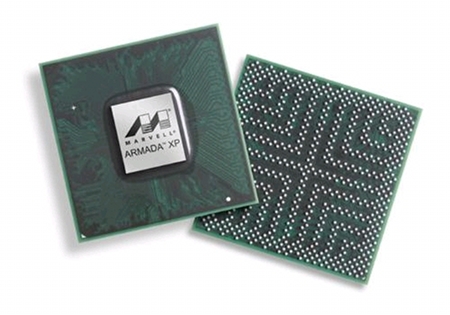Another step forward for ARM-based servers?
Nov 17, 2010 — by LinuxDevices Staff — from the LinuxDevices Archive — 1 viewsSmooth-Stone, which is looking to build ARM-designed chips for low-power servers, is changing its name to Calxeda. The company is hiring executives with backgrounds at such places as IBM, HP, Marvell, and Polycom.
Having announced $48 million in funding three months ago, Smooth-Stone now says it is changing its name to Calxeda. One of several companies that are now looking to drive ARM-based chips into the data centers currently dominated by x86 processors, it also announced the hiring of three new executives.
Karl Freund, a former marketing executive with HP who most recently was vice president of marketing and strategy for IBM's System z mainframe business, is now Calxeda's vice president of marketing. Enterprises worried about the rising costs of data center power and space are demanding fast action from the tech industry, Freund claims.
"The industry needs a new clock, not just another tick or tock," he said in a statement, referring to Intel's "tick-tock" schedule for processor releases. "Mere modest improvements in efficiency will not remove the barriers to innovation that frustrate clients today. That's why I came to Calxeda: to help turn this vision into a reality."
Also coming to Calxeda are Bob Baughman, who had been with Polycom and Marvell and will be the company's vice president of business development and sales, and Steve Beatty, a former executive with Freescale and SigmaTel, who will be vice president of manufacturing.
Calxeda CEO Barry Evans is echoing Freund's comments that a major leap is needed to address power and space concerns of today's enterprises.
"We believe the solution requires this order of magnitude improvement, literally ten times the energy efficiency, for half the price," Evans said in a statement. "This is within our reach with technologies we are developing at Calxeda."
Background
Calxeda is expected to release samples of its SoC (system-on-a-chip) server processors next year and start manufacturing the chips in 2012. The multicore chips will be based on ARM's Cortex-A9 processor design, which offers up to four cores per chip.
Officials with ARM, whose chip designs are used by such manufacturers as Qualcomm, Samsung and Texas Instruments, are looking to give their customers the capabilities to move up into the data center. As manufacturers start to adopt the Cortex-A9 design, ARM in September unveiled its Cortex-A15 design, formerly codenamed "Eagle."
The Cortex-A15 design will offer several enhancements — including support for possibly as many as 16 cores, support for virtualization and up to 1TB of memory — that will enable it to move into such enterprise products as servers and storage devices. (For further information, see our earlier detailed coverage, here.)

Marvell's Armada XP
Earlier this month, Marvell officials demonstrated their quad-core Armada XP chip (above), which runs at 1.6GHz and offers such enterprise-class features as up to 2MB of Level 2 cache, high-end networking ports and PCI-Express Gen 2.0 units. Based on the ARM v7 architecture, the SoC will be aimed at such environments as web servers, cloud computing, and high-volume home servers.
Should ARM-based servers prove to be popular, they'll present an additional challenge for Microsoft, which does not currently offer an appropriate operating system. (The company's Windows CE-based technologies, including Windows Embedded Compact 7, are currently coded for client devices only.)
Further information
More information about Austin-based Calxeda may be found on the company's website, here.
Jeffrey Burt is a writer for eWEEK.
This article was originally published on LinuxDevices.com and has been donated to the open source community by QuinStreet Inc. Please visit LinuxToday.com for up-to-date news and articles about Linux and open source.